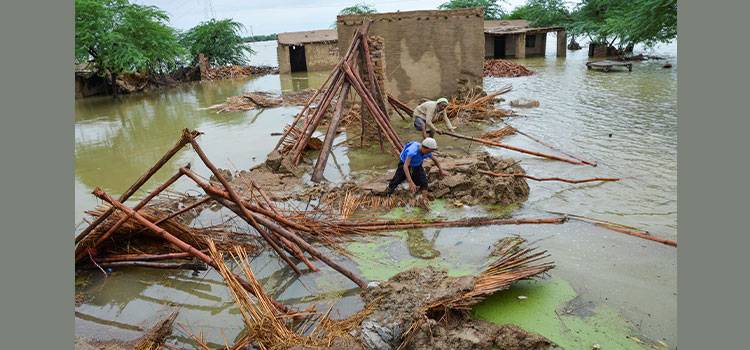
Climate change has become a significant concern for Pakistan in recent times, adding to the array of challenges that influence its present and future. Alongside persistent issues like terrorism, economic difficulties, political instability, and energy crises, Pakistan now faces the formidable threat posed by climate change.
One of the most visible impacts of climate change in Pakistan is the rise in temperatures. Heatwaves have become more frequent and intense, resulting in widespread discomfort, and posing a severe risk to public health. Cities like Karachi and Lahore have experienced scorching summers, with temperatures soaring above 50 degrees Celsius. Such extreme heat events not only cause heatstroke and dehydration but also strain energy grids and exacerbate water scarcity issues.
Speaking of water, Pakistan's water resources are under immense pressure due to climate change. The country relies heavily on the Indus River system, which supports agriculture, industry, and the livelihoods of millions of people. However, changing rainfall patterns and melting glaciers in the Himalayas have disrupted the flow of water, leading to increased water scarcity and heightened competition among various sectors.
Moreover, the irregularity of monsoon rains has resulted in devastating floods in some areas and prolonged droughts in others, exacerbating the challenges faced by farmers and exacerbating food security concerns. In 2022, Pakistan experienced one of the most devastating flood events in its history. Heavy monsoon rains unleashed torrential downpours, causing rivers to overflow, and triggering widespread flooding across the country.
The floods inundated villages, washed away homes, and destroyed vital infrastructure, leaving a trail of destruction in their wake. Thousands of people were displaced, and loss of life was significant. The 2022 floods served as a stark reminder of the vulnerability of Pakistan to the increasing intensity of extreme weather events linked to climate change.
Pakistan, despite being a developing nation, contributes a low percentage of global greenhouse gas emissions. According to the World Resources Institute, Pakistan's emissions account for less than 1% of the global total. This emphasises that the country bears a disproportionately small responsibility for causing climate change compared to developed nations that have historically emitted substantial amounts of greenhouse gases.
Despite its minor contribution to global emissions, Pakistan is among the countries most impacted by the consequences of climate change. This disparity highlights the unjust burden placed on developing nations. The effects of climate change, such as rising temperatures, erratic rainfall, and extreme weather events, have significantly disrupted Pakistan's ecosystems, economy, and communities. The vulnerability of Pakistan to climate change is exacerbated by the actions and emissions of developed countries. Historically, these nations have been the major contributors to global greenhouse gas emissions. Their industrialisation, reliance on fossil fuels, and elevated levels of consumption have driven global warming and, consequently, have had a direct impact on countries like Pakistan.
Despite these challenges, Pakistan has taken some initiatives to address climate change. The country has committed to the goals of the Paris Agreement and has implemented various initiatives to reduce emissions and increase resilience. For instance, Pakistan aims to generate 60% of its electricity from renewable sources by 2030. The government has also launched reforestation projects and improved disaster management strategies to mitigate the impact of climate-related events. Moreover, initiatives like the Billion Tree Tsunami project aim to restore forests and protect biodiversity. Pakistan is also strengthening its early warning systems and disaster management strategies to minimize the impact of extreme weather events.
However, the magnitude of the climate crisis requires collective global action. Developed nations bear a moral and ethical responsibility to support developing countries like Pakistan in their climate change adaptation and mitigation efforts. This support should include financial assistance, technology transfer, and capacity building to enhance resilience and sustainability.
Pakistan's struggle against climate change serves as a tragic reminder of the urgent need for global cooperation and climate justice. Developing nations should not endure the most of a crisis they have contributed little to, while they face the most severe consequences.
By acknowledging this disparity and working together, the international community can ensure a more equitable and sustainable future for Pakistan and the world. In this battle against climate change, Pakistan stands not only as a victim but also as a resilient nation determined to overcome the challenges it faces.
By recognising the urgency of the issue, addressing historical imbalances, and working together, we can strive for a more just and sustainable future, where the impacts of climate change are shared equitably among nations.

